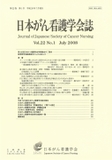Japanese
English
- 販売していません
- Abstract 文献概要
- 参考文献 Reference
要旨
本研究の目的は,患者が移植の自己決定した過程および,病名告知から移植実施に至るまでの身体的問題,心理・社会的問題を明らかにし,造血幹細胞移植(以下,移植)を受ける患者の自己決定を支援するための看護介入プログラムを開発することである.
半構成的質問紙を用いた面接を,研究参加に同意を得られた18〜55歳の移植を受けた患者(13名)に行い,対象者が移植を医師から説明され決定し,移植を受けるまでの期間における身体的苦痛について内容を分析した.
その結果,移植に関する受け止めは,『命が助かる』,『移植しかない』,『先延ばしできない』,『病院に来なくて済む』の4つのカテゴリーに分類され,疾患や治療の解釈がさまざまであった.特に意思決定するまでの気持ちの揺れと迷いは,〈移植の目的の再確認〉〈自己の有能さの再確認〉の2つのフィードバックの過程であると考えられた.医師から提示された移植を外発的動機づけによって選択した後,気持ちの揺れや迷いに対処して内発的動機づけによる移植の自己決定へと転換する過程であり,一度行った意思決定を移植までの期間に前向きに進めるためには,Deciの認知的評価理論が適応できると考えられた.
移植を受ける患者の自己決定を支援するためには,自己決定の過程での気持ちの揺れや迷いに対処できることが必要である.これらのことから,認知的・情緒的・教育的支援と積極的傾聴を用いて内発的動機づけによる自己決定を支援するための看護介入プログラムを開発した.
Abstract
The present study was undertaken to investigate the decision making process by patients concerning transplantation, and to identify physical, psychological, and social problems in the course from disclosure of disease to transplantation, with the ultimate goal of developing a nursing intervention program to provide support to patients undergoing hematopoietic stem cell transplantation(hereinafter "transplantation").
Interviews using a semi.structured questionnaire were conducted with 13 patients who had undergone transplantation and given informed consent to participate in the study(age 18.55 years). Their responses were analyzed in terms of the physical stress and pain they had experienced during the period between the explanation about transplantation provided by their attending physician to the time of transplantation.
Views held by patients about transplantation could be classified into four categories: "my life can be saved," "no other means is available," "cannot postpone the decision any more," and "hospital visits will be unnecessary after transplantation." The way patients interpreted their disease and treatment varied greatly among individuals. Emotional fluctuations seen prior to making the decision to undergo transplantation appeared to reflect two feedback processes: "reconfirming the objective of transplantation" and "reconfirming one's competency." During these processes, patients select the option of transplantation proposed by the physician through external motivation and convert it to an individual decision through intrinsic motivation while overcoming emotional fluctuation. Nursing intervention based on Deci's cognitive evaluation theory will be useful in helping patients who have made their decision about transplantation to continue in a positive attitude toward the time of transplantation.
In supporting patients in making decisions about transplantation, it is essential to help them deal with emotional fluctuations during the decision.making process. Based on these findings, we developed a nursing intervention program designed to support intrinsic motivation.based self-decision, making use of cognitive, emotional, and educational support and paying adequate attention to the patient's own voice.
Copyright © 2008, Japanese Society of Cancer Nursing All rights reserved.


